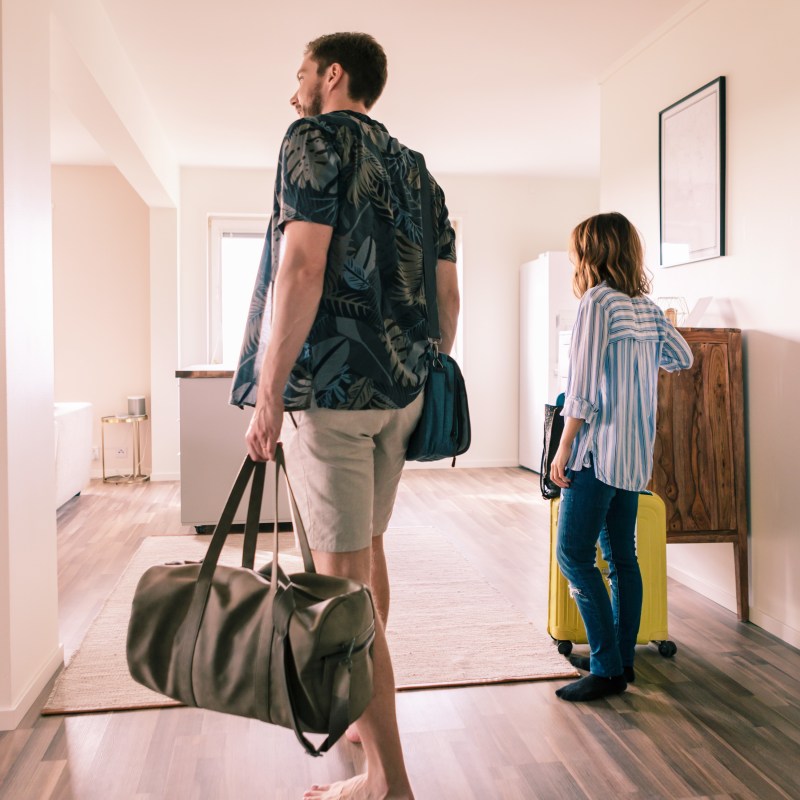
When Airbnb first launched, the hospitality world was flipped on its head.
Videos by TravelAwaits
Suddenly, travelers could access pied-a-terres around the world and manage their own bookings on an easy-to-use platform.
No spiked prices. No loyalty programs. No add-on charges.
At least, not at first.
Since Airbnb revolutionized the way the average traveler books a room, the platform has seen many ups and downs. On the positive side, it’s innovated unique experiences headed by celebrities and iconic settings—and on the negative, it’s also gotten the boot from more than a few cities.
Love it or hate it, Airbnb is now part of the hospitality space seemingly for good.
But with climbing fees, less-than-satisfactory hosts, and a myriad of other creeping concerns, is it better to get a hotel or Airbnb?
There’s no fast-and-easy answer—but there are a few metrics we can use to dig in and learn more.
Is it better to get a hotel or Airbnb? Here’s what you need to consider
Cost: most hotels and Airbnbs are comparable
Airbnbs aren’t the affordable solution to lodging that they once were. To be fair, Airbnbs and hotels both come in all shapes and sizes. There are boutique and high-design options, along with budget stays with the bare amenities.
That being said, with climbing nightly rates and a bevy of unexpected add-on fees (from cleaning to check-in), Airbnb’s competitive pricing is no longer a guarantee.
On top of that, a hotel’s room rates come with a long list of standard amenities, from room cleaning to ice machines to indoor pools.
By contrast, every Airbnb has a different nightly rate with a series of unique fees. In other words, there’s no industry standard in Airbnb like there is in hotels, which means you can find heavy savings… or predatory pricing for sub-par stays.
Amenities: hotel amenities are a stronger guarantee
As outlined in the section above, hotels come with a familiar set of amenities. These amenities are linked to the star rating of the hotel; the more amenities, the higher the star rating.
From buffet breakfasts to rooftop pools, every rating translates to a different set of hotel features.
Airbnbs, by contrast, differ with each location. The only catch is that hosts are responsible for writing summaries of their stays—which may or may not be accurate. In reality, I recommend travelers dig through Airbnb reviews to make sure those amenities are as promised.
Service: hotels have entire teams working for you
Is it better to get a hotel or Airbnb when it comes to service? This time, the answer is a little easier: a hotel has better service.
Airbnb hosts might be hands-on with their guests, offering city guides, recommendations, and other types of support. The key word there is might. Airbnb hosts aren’t required to offer personalized service or even show their faces to guests.
If you like your privacy, that’s probably a huge plus.
If not, go with a hotel. Hotel staff are available to help you do just about anything, from booking taxis to learning about local attractions to dropping off an extra towel.
While that type of attention to care and detail certainly exists at many highly-rated Airbnbs, they’re far and few between in my experience.
Length of stay: Airbnbs are cheaper for longer-term stays & for larger groups
You might think I’ve been paid by Big Hotel to write this article given I’ve been pretty critical of Airbnbs. But there are plenty of ways in which Airbnbs outshine their industry cousins.
Compared to hotels, Airbnbs are a fantastic choice for long-term stays.
Not only are they cheaper to book for longer periods of time, but they’re also a lot more homely. (I lived in an extended-stay hotel for a few months once upon a time—it was soul-crushing despite the quality facilities.)
An Airbnb can become a home-away-from-home for students, professionals, and anyone else who needs to book a place for a few months.
The same is true for larger group stays. Thanks to homey living rooms and other additional spaces, families and large groups can more easily lounge around and hang out compared to a hotel.
Local regulations: Airbnbs face heavy regulations
Airbnb has proved so popular that dozens of cities around the world are actually fighting to regulate the private rental market. Cities like Berlin and New York City have already taken a strict stance on Airbnb rentals, closely regulating when and how hosts can put rooms and apartments up for rent.
By contrast, I’ve never heard of an illegal hotel setting up shop. And I’ve never recommended someone look up the legality of a hotel before booking.
But I do recommend that you look for a regulation code and license number before booking an Airbnb. If you don’t see one listed, it’s possible that it’s being run illegally.
Travel experience: Airbnbs take you closer to the action
One reason that Airbnb has succeeded and grown is thanks to its unique premise. The home-stay setup offers travelers an up-close look at their destination.
They live like locals compared to those who choose a hotel stay.
That type of immersion usually ends up being a memorable part of the trip because it directly shapes the traveler’s impression of a place—either for better or for worse.

